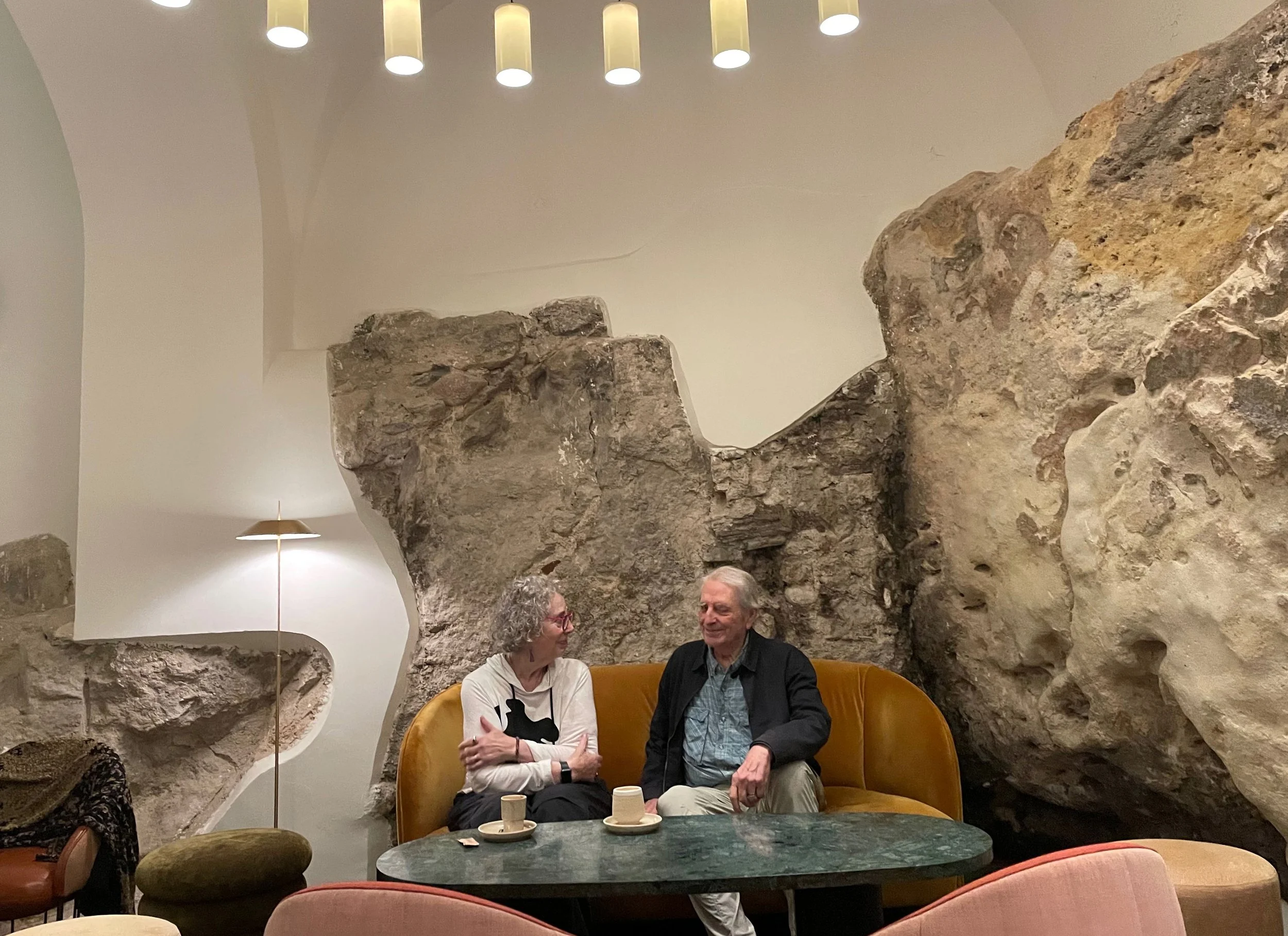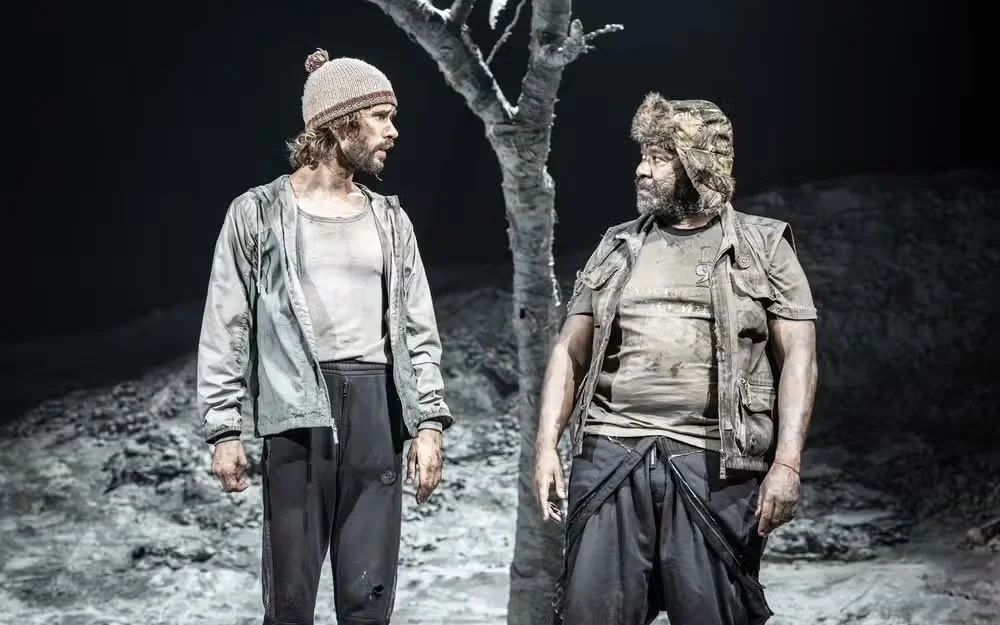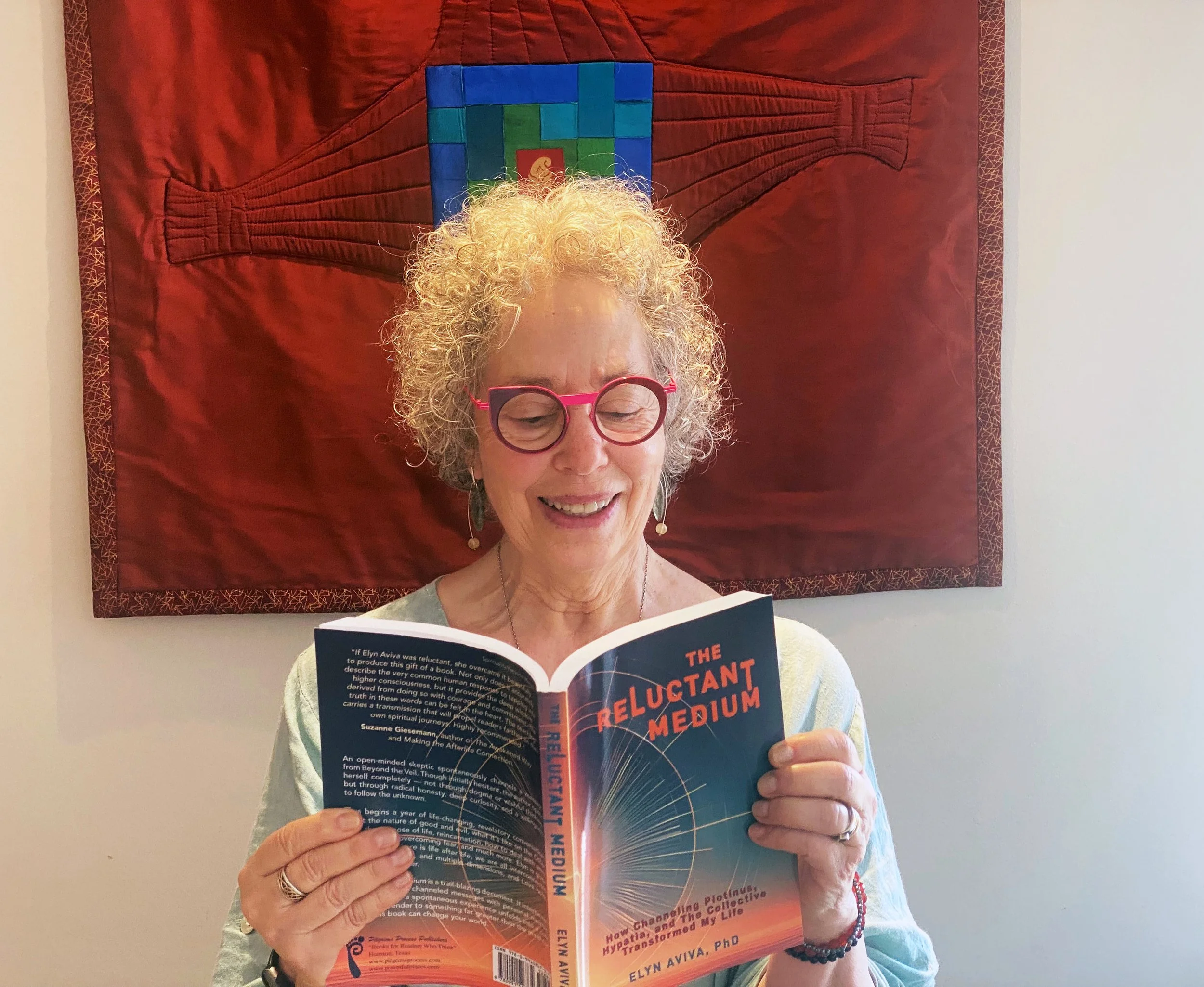Traveling to Other Dimensions
By Elyn Aviva
My husband, Gary White, and I recently returned to live in Girona, Catalonia, Spain. We had lived here for eight years, left, then felt called to return. Since we have settled in, we have had no desire to travel elsewhere. Blame it on the lingering after-effects of the pandemic, blame it on our age (I’m 78, Gary’s 87), blame it on the increasing hassles of airline flights and disruption.
But that doesn’t mean we’re not going anywhere. In fact, we find ourselves traveling to places that we never knew existed. Places you don’t get to by taking an Uber or using GPS coordinates. Places that exist elsewhere and here at the same time.
After we moved back to Girona, Gary and I discovered Gipsy, a delightful bar on the ground floor of the five-star Hotel Palau Fugit. Palau Fugit is an 18th-century palace, remodeled in 2022 to become a luxe hotel with a spa, café, and restaurant. We soon made a habit of stopping in, strolling through the atrium café, and walking up the three short steps to the coffee nook hidden next to the barista station. The walls of the coffee nook are made of rough stone blocks and large chunks of beige-colored bedrock, interspersed with mortar and large swaths of white plaster. It’s a charming, relaxing area, with comfortably padded chairs and low tables. Most people don’t know it’s there.
One day Gary and I were sitting there sipping our espresso and café con leche, talking about our next book project, “Adventures of Everyday Mystics.” Lots of questions arose, including: Is the universe disinterested or engaged with humans? Why do souls reincarnate (assuming they do)? Do souls really make a destiny plan for what to experience when they come to Earth? What is evil and how does it fit into a loving universe? Can we communicate with “the dead”?
This last question wasn’t really a question, since we’d been studying for four years with Suzanne Giesemann, a retired Navy Commander turned evidential medium. Suzanne always emphasizes the importance of evidence, hence, evidential mediumship. Although we’d been taking her online classes, neither of us actually wanted to—or planned to—become a medium. We were just curious and wanted to explore the evidence for life after physical death, spirit guides, etc. The more we studied with Suzanne, the more books we read, the more we watched other reputable channelers at work, the more we agreed that the continuity of spirit from this life to another was feasible and made sense.
We were engaged in a rather intense conversation about these topics when I suddenly felt a voice eagerly wanting to come through me and speak. I could feel the inside of my mouth change shape a little. I spoke a few words in a deep, masculine, slightly accented voice—and then I stopped. I wasn’t at all sure I wanted to channel someone! Then I decided, “Okay, I’ll give it a try.” I gave a “mental nod” of permission, felt my mouth cavity change shape again, and spoke in a voice that was not my own. Here’s what came through:
“We humans are here to experience the full range of experience. That’s why we have incarnated. We learn from the ‘bad’ more than from the ‘good.’ We are in the process of spiritual evolution, and we need to have the full range of experiences to evolve.”
He was responding to the questions we’d been asking each other! I had the presence of mind to ask, “Who are you?” I “heard” the answer: someone with a name beginning in P. The name Plotinus flashed before me. Then he was gone.
Gary was watching me, wide-eyed. “That was interesting,” he said.
I nodded.
Thank goodness our cozy coffee nook had good Wi-Fi. I took out my iPhone and immediately Googled Plotinus. Widely considered the founder of Neoplatonism, Plotinus was a Greek philosopher who lived in the 3rd century. His writings address many of the very questions Gary and I were asking each other.
Plotinus
Stunned, I finished sipping my espresso. We sat in silence for a while, then paid our bill and walked out of the hotel into a subtly altered reality. It was one thing to take courses in channeling and contacting spirit guides—it was quite another to have a being “come through” me to comment on our book project. I wondered how long Plotinus had been eavesdropping.
I was shaken by the experience. After all, if Plotinus really was “real,” then life after death or continuity of consciousness really is real. This experience had suddenly shifted me from an intellectual, arms-length acceptance (“it makes sense to me”) to an intensely personal, experiential knowing. It was unsettling, to say the least.
The next day, we went back to Palau Fugit, and Plotinus started to come through again. Gary said he could see the change occurring. I was suddenly looking off in the distance, and then my face shifted subtly. I was “listening.” As I felt my mouth start to change shape, I resisted and exclaimed “No!” and stopped the process. Gary suggested I say, instead, “Not now.” After all, if I wanted to continue communicating with whatever/whoever this energy being was, a polite “Not now” was better than a forceful “No never!” He was right.
That evening, I went into my studio/meditation space. I invited Plotinus to join me and have a conversation, which I wrote down.
I felt his presence and said, “I’m uncomfortable channeling your voice aloud, as opposed to inner contact.”
Plotinus: “I needed to get your attention and for you to know I’m real. That’s why I ‘came through’ you.”
Me: “Why me?”
Plotinus: “I saw your lights shining and heard your questions. Questions I spent my life answering. I will help you as I can.”
Me: “Thank you. Is there something special about the coffee nook in Palau Fugit?”
Plotinus: “No. It’s not the locale, it’s the mind-set. I can talk with you anywhere.”
Me: “I look forward to that.”
Plotinus: “I will come again whenever you request. I’m always here and eager to help an aspect of the One.”
Over the next few weeks, Plotinus showed up regularly at Palau Fugit and during my meditations. On one of his visits, I asked Plotinus to tell me something I didn’t know. Even though I had plenty of proof he was who he said he was, I wanted more evidence that he wasn’t a figment of my imagination or my subconscious.
He replied, “Iambycus (sic) was a dirty man. He didn’t bathe.”
Iambycus? Never heard of him. I immediately did a Google search and learned that Iamblichus was an Arab Neoplatonic philosopher, c. 245 - c. 325. He studied under Porphyry, the pupil of Plotinus who compiled his writings into the Enneads. I couldn’t find out if Iamblichus was a dirty man, but I learned that he vehemently disagreed with aspects of Plotinus’s philosophy.
I continue to have fruitful exchanges with Plotinus and with a growing group of beings on the Other Side. I never expected to be traveling to this other realm instead of taking a holiday in Ireland or spending the weekend on the Costa Brava.
I’ve learned there are many kinds of travel, and sometimes the journeys we least expect are the most important. I haven’t shared this story until now. I’ve been afraid that people would question my sanity. I don’t want to be ridiculed. But the time has come.
As Plotinus said in the Enneads, “We must close our eyes and invoke a new manner of seeing, a wakefulness that is the birthright of us all, though few put it to use.”
Elyn Aviva, PhD, MDiv, is a transformational traveler, writer, and fiber artist, and co-author with her husband, Gary White, of Powerful Places Guidebooks. She lives in Girona, Catalonia, Spain. She has written books on pilgrimage and novels. To learn more, visit www.pilgrimsprocess.com, www.fiberalchemy.com, and “Elyn Aviva Writes” on Facebook.









